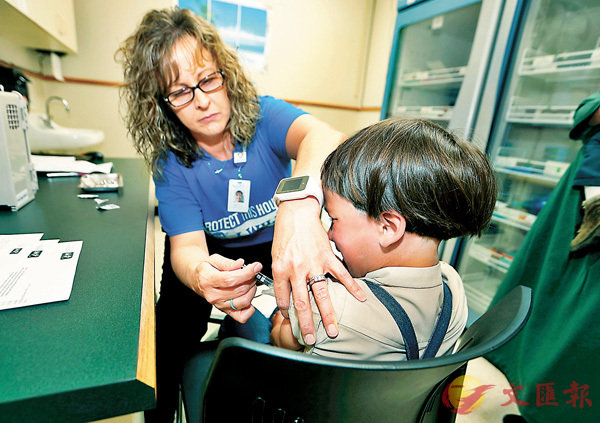 ■研究顯示許多受訪者不信任疫苗的安全性和效用。 資料圖片
■研究顯示許多受訪者不信任疫苗的安全性和效用。 資料圖片【原文】下文摘錄自香港《文匯報》2019年6月20日報道︰
一項針對全球對疫苗(vaccine)問題的歷來最大規模研究顯示,許多受訪者均不信任疫苗的安全性和效用(effectiveness),窒礙各國應對可預防的(preventable)致命傳染病(infectious disease)的努力,世界衛生組織(World Health Organization)形容這已構成「全球危機」(global crisis)。研究同時指出,在歐洲(Europe)和北美(Northern America)等人均收入較高地區,公眾對疫苗的信心卻較低,在南亞(South Asia)和東非(Eastern Africa)等地區反而較高,反映發達國家的人民對傳染病警覺性不足,未能正確認識疫苗的重要性。
英國慈善基金會「惠康基金會」(Wellcome Trust)和民調機構蓋洛普(Gallup)合作,在全球140多個國家共訪問逾14萬人,發現全球平均79%的人認同疫苗安全,但各地對疫苗的信任度有極大差異(variation),例如西歐(Western Europe)和東歐(Eastern Europe)分別只有59%和50%人認為疫苗安全,法國(France)更有多達33%人質疑疫苗安全性,比率是各國中最高,當地近兩成人更認為疫苗沒有效用。不過,在南亞和東非地區則分別有95%和92%人,相信疫苗安全和有效,其中盧旺達(Rwanda)和孟加拉(Bangladesh)的比率均屬全球最高。
參與研究的「疫苗信心計劃」(Vaccine Confidence Project)主任拉森(Heidi Larson)指出,歐洲地區民眾的收入和教育水平相對較高,但不信任疫苗的比率卻出奇地高,情況令人費解。她同時表示,社交平台(social platform)充斥不少反疫苗言論,加深公眾對疫苗的疑慮,加上這類不實資訊,通常均在facebook的私人群組(private group)又或一般人較難登入的論壇內流傳,令科學家更難澄清(clarify)。
「惠康基金會」公關主管伊姆蘭汗(Imran Khan)表示,研究顯示當一個地區的居民,對當地醫療系統(healthcare system)和科學家更有信心,對疫苗的信任度亦隨之上升,相反,倘若政府和公共機構未能取信於民,只會令更多人質疑疫苗的作用。
伊姆蘭汗指出,孟加拉和埃及(Egypt)等發展中國家傳染病頻生,國民明白到不接種疫苗,便極可能受感染,故他們的警覺性較高,亦更願意接種疫苗。反而發達國家的醫療制度健全,即使未有接種疫苗,國民染病機會仍較發展中國家為低,而且國民認為即使「中招」,亦不會嚴重不適或致命,令他們掉以輕心,輕視接種疫苗的重要性。
「全球疫苗聯盟」(Gavi, the Vaccine Alliance)執行主任伯克利(Seth Berkley)指出,白喉(diphtheria)、麻疹(measles)和百日咳(whooping cough)等疾病在發展中國家很常見,他曾看見不少母親排隊等候多時,確保她們的孩子能接種疫苗,但在富裕國家,人們較少接觸傳染病,不明白其可怕之處,因此不重視接種疫苗。
Global crisis of vaccine hesitancy-one in three French people regard vaccines as unsafe
【譯文】The biggest global survey into attitudes on immunization suggests low confidence in the safety and effectiveness of vaccination, hampering the efforts of various countries to fight against deadly yet preventable infectious diseases, and such public mistrust of vaccines has been described by the World Health Organization (WHO) as a "global crisis". Meanwhile, the study also shows that people living in several higher-income regions such as Europe and Northern America are often skeptical about the vaccines, while those in South Asia and Eastern Africa have comparatively higher trust, reflecting that people in more developed countries are however less alert to infectious diseases as well as fail to understand the importance of vaccination.
The survey, jointly conducted by the British medical charity Wellcome Trust and the analytics and advisory company Gallup, canvassed the attitudes among 140,000 people in over 140 countries and discovered that an average of 79% agreed vaccines were safe but there was still a wide variation in the figures, for example, only 59% and 50% of people surveyed in Western Europe and Eastern Europe considered vaccines safe respectively, yet, up to 33% in France considered them questionable, making it the highest ratio for any country worldwide, and nearly 20% disagreed that vaccines were effective. Notwithstanding the mistrust in vaccines among most Western countries, 95% and 92% of people in South Asia and Eastern Africa believed in the safety and effectiveness of vaccines respectively, of which the highest rates in the globe were founded in Rwanda and Bangladesh.
Professor Heidi Larson, Director of the Vaccine Confidence Project, said it was surprising that people in Europe had extremely low confidence in vaccines even though they had relatively high level of income and education. She added that some social platforms were even promoting anti-vaccination movement which might result in accelerating unpleasantness over vaccines, and it was often not easy for scientists to make clarifications on the false and misleading speeches spreading over the private groups on Facebook or online forums with only limited access.
Imran Khan, Head of Public Engagement at Wellcome Trust, said if the general public had trust over the local healthcare system and scientists, their confidence in vaccines would also be higher; on the contrary, if the government institutions failed to win the trust of people, the doubts over vaccines' safety and effectiveness would be deepened.
He further explained that as infectious diseases were common in developing countries such as Bangladesh and Egypt, people were more alert and willing to vaccine as they might put their health at risk if they did not do so. Yet, as sound medical system was in place in more developed countries, people there were often less willing to follow suit as they might be less likely to catch infection even if they did not vaccinate, or it was unlikely to bring about fatal illness even if they get infected, so they did not really place much importance on vaccination.
Dr. Seth Berkley, CEO of Gavi, the Vaccine Alliance, pointed out that diseases such as diphtheria, measles and whooping cough were commonly found in developing countries, and he had seen many mothers waiting in line just to ensure that their children could get vaccinated, but people in wealthier countries faced relatively low risk of infection and hence gained little understanding on deadly diseases and paid less attention to vaccination.■龐嘉儀
Q&A
1. 歷史上首劑牛痘(cowpox)疫苗的產生是用以對抗什麼疾病?
2. 牛痘疫苗於1796年由哪位英國醫生發明?
3. 疫苗的英語源自於牛痘「vaccine」,該詞源自於哪個拉丁文詞彙?
4. 據世衛資料顯示,「反疫苗」運動令去年全球麻疹個案急增多少個百分比?
5. 本港政府每年最常推廣什麼疫苗接種計劃?
Answer
1. 天花(smallpox)
2. Edward Jenner
3. Vacca,意思為牛
4. 50%
5. 季節性流感疫苗

